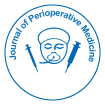
ஜர்னல் ஆஃப் பெரியோபரேட்டிவ் மெடிசின்
திறந்த அணுகல்
ஐ.எஸ்.எஸ்.என்: 2684-1290

ஐ.எஸ்.எஸ்.என்: 2684-1290
Hounkpe PC, Ahounou E, Akodjènou J, Agbocki E, Biaou COA
Introduction: peritonitis is a surgical emergency. Because of their frequency, they are a public health problem in subSaharan Africa. The delay in appropriate medical and surgical management is responsible for high morbidity and mortality.
Objective: To assess the perioperative management of peritonitis.
Materials and methods: A retrospective, descriptive and analytical study over a 12 months-period. Sociodemographic, clinical, therapeutic and evolutionary data were studied. These data were entered and analyzed with Epi Data 3.1 and SPSS version 21 software. For the comparison of the results, the chi-square test or the exact Fischer test were used as appropriate. The significance threshold was for a p-value ≤ 5%.
Results: The frequency of peritonitis was 21%. The mean age was 28.7 years. The sex ratio was 1.65. The majority of patients (87%) had surgery within 24 hours of admission. Anesthesia was general with crush induction in all cases and was provided mainly by nurse anesthetists in 85% of cases. 75% of patients were followed up postoperatively in the intensive care unit. Mortality was 10.39%. Age over 60 and delay in surgical management over 48 hours has been associated with death.
Conclusion: Peritonitis was very frequent at CHUD/OP and represented 21% of digestive surgeries. The medical and surgical management suffered from a lot of insufficiency.